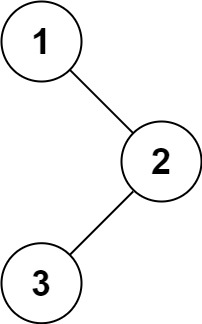Understand what the interviewer is asking for by using test cases and questions about the problem.
- Established a set (2-3) of test cases to verify their own solution later.
- Established a set (1-2) of edge cases to verify their solution handles complexities.
- Have fully understood the problem and have no clarifying questions.
- Have you verified any Time/Space Constraints for this problem?
O(n) time complexity and O(n) space complexityHAPPY CASE
Input: root = [1,null,2,3]
Output: [1,3,2]
Input: root = [1]
Output: [1]
EDGE CASE
Input: root = []
Output: []Match what this problem looks like to known categories of problems, e.g. Linked List or Dynamic Programming, and strategies or patterns in those categories.
If you are dealing with Binary Trees some common techniques you can employ to help you solve the problem:
Plan the solution with appropriate visualizations and pseudocode.
General Idea: In-Order traverse is left-process-right. Lets go left, store, and go right for each node.
1. Create a helper function to recursively progress through the nodes.
a. Basecase, root is none.
b. Go to left node
c. Store node value into results
d. Go to right node
2. Create results array
3. Call helper function to build results
4. Return results ⚠️ Common Mistakes
Implement the code to solve the algorithm.
# Definition for a binary tree node.
# class TreeNode:
# def __init__(self, val=0, left=None, right=None):
# self.val = val
# self.left = left
# self.right = right
class Solution:
def inorderTraversal(self, root: Optional[TreeNode]) -> List[int]:
# Create a helper function to recursively progress through the nodes
def helper(root: Optional[TreeNode]):
# Basecase, root is none.
if not root:
return
# Go to left node
helper(root.left)
# Store node value into results
results.append(root.val)
# Go to right node
helper(root.right)
# Create results array
results = []
# Call helper function to build results
helper(root)
# Return results
return resultsclass Solution {
public List<Integer> inorderTraversal(TreeNode root) {
// Create results array
List<Integer> ret = new ArrayList<>();
// Call helper function to build results
dfs(root, ret);
// Return results
return ret;
}
// Create a helper function to recursively progress through the nodes
private void dfs(TreeNode node, List<Integer> ret) {
// Basecase, root is none.
if (node == null) {
return;
}
// Go to left node
dfs(node.left, ret);
// Store node value into results
ret.add(node.val);
// Go to right node
dfs(node.right, ret);
}
}Review the code by running specific example(s) and recording values (watchlist) of your code's variables along the way.
Evaluate the performance of your algorithm and state any strong/weak or future potential work.
Assume N represents the number of nodes in Tree
O(N) because we need to visit each node in binary tree.O(N) because we need to create a results array with the values from all the nodes. 